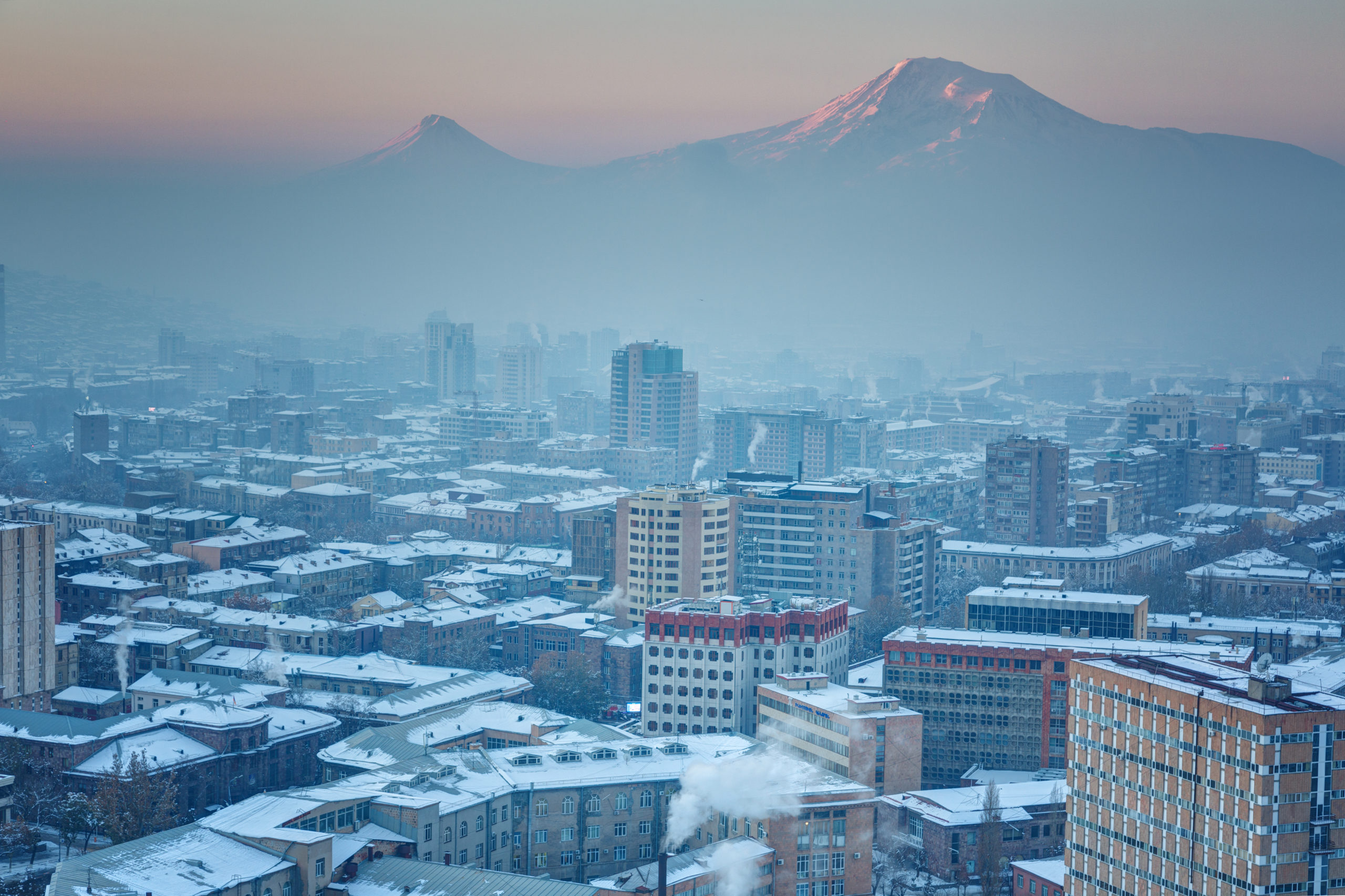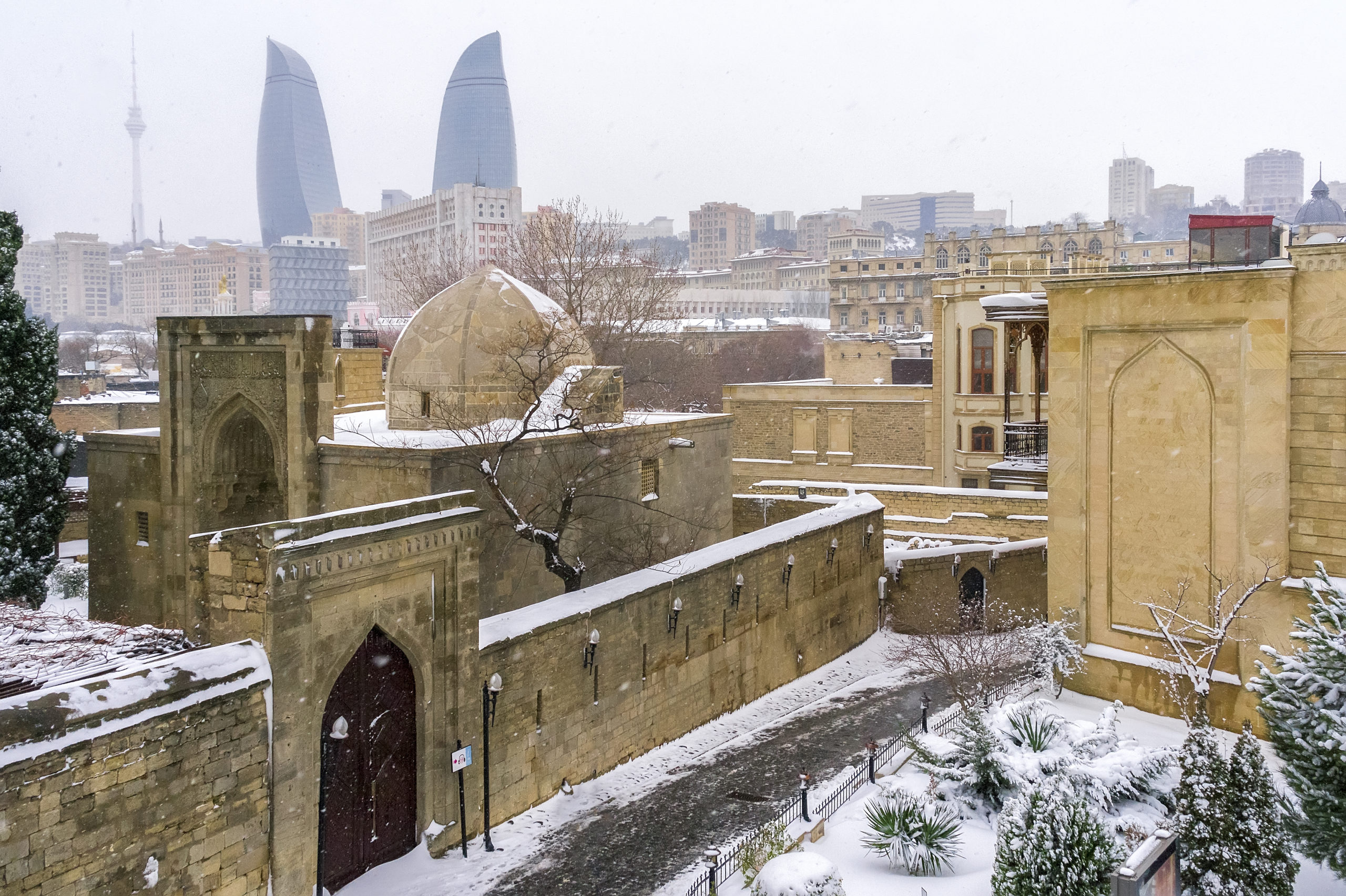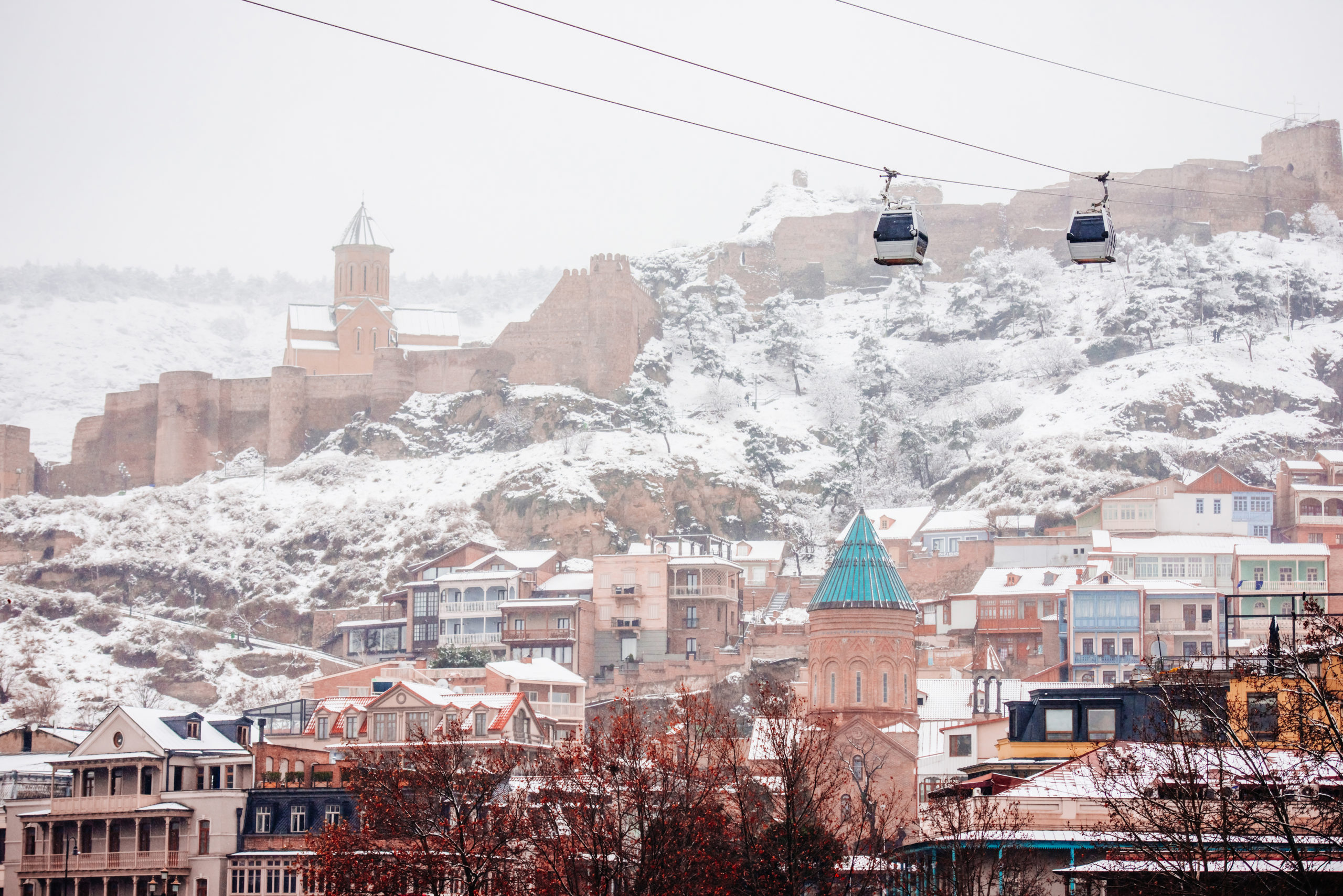Strategic Analysis Caucasus Brief
Bi-weekly review (14. – 27.12. 2021)
Tomáš Baranec
Armenia

Yerevan in Winter, Armenia. Photo: Elena Shchipkova/ Shutterstock.com
Pashinyan and Aliyev meet in Brussels
Armenian Prime Minister Nikol Pashinyan and Azerbaijani President Ilham Aliyev pledged to de-escalate tensions and restore railway lines during a summit in Brussels hosted by European Council President Charles Michel on December 14, informed the Armenian Weekly.
According to a statement released by Michel after the meeting, Pashinyan and Aliyev agreed to take “further tangible steps” to “reduce tensions on the ground to ensure a conducive environment” for negotiations on delimitation and demarcation of the state border. The EU committed to providing an expert consultative group to provide technical assistance in the delimitation and demarcation process.
Following the meeting, Azerbaijani president Ilham Aliyev criticised Armenia. “So far, there are no positive signs”, he said, referring to the possible normalisation of relations. “We must learn to live side by side, gradually preparing the ground for the normalisation of relations, including contacts between people”. “We won the war, we are the winner, this reality must be taken into account”, Aliyev said.
He also reiterated his previous claims that the Nagorno-Karabakh conflict has been resolved. “There is no going back to discussing the status of Karabakh or anything like that”, he said.
The leaders agreed to “proceed with the restoration of railway lines, with appropriate arrangements for border customs and controls, based on the principle of reciprocity.” According to Pashinyan, the railways will operate “within the sovereignty and jurisdiction of the countries,” and Armenia will have railway access to Iran and Russia.
As the OC Media reminds, the issue of reopening transport links, especially between mainland Azerbaijan and the enclave of Nakhchivan, dubbed the “Zangezur corridor” by Azerbaijani authorities, has continued to be a point of contention.
While the agreement does not specify any status given to such transport links, the Azerbaijani president has repeatedly demanded a “corridor” that would be under Azerbaijan’s jurisdiction.
Before the meeting, in a briefing with the NATO Secretary-General Jens Stoltenberg, the Azerbaijani president suggested that the legal aspect of the “Zangezur corridor” should be “fully similar to the regime of the Lachin corridor”. The Lachin corridor connects Nagorno-Karabakh with Armenia and, since the war, has been under the control of Russian peacekeepers.
“Today, there are no customs in the Lachin corridor. Therefore, there should be no customs in the Zangezur corridor. If Armenia insists on using customs facilities to control cargo and people, then we will insist on the same in the Lachin corridor. This is logical”, Aliyev said as cited by the OC Media.
One day later, both leaders met also with French President Emmanuel Macron. The meeting was not planned, or at least was not announced in advance.
No details have been reported on the exact topics that the Armenian Prime Minister and the President of Azerbaijan have discussed with the mediation of Emmanuel Macron. It is only known that the meeting took place after the end of the EU – Eastern Partnership summit, which was also attended by the leaders of Armenia and Azerbaijan.
Sources:
- AVETISYAN Ani, OC Media, „Aliyev and Pashinyan meet one-on-one in Brussels“, https://oc-media.org/aliyev-and-pashinyan-meet-one-on-one-in-brussels/
- AVEDIAN Lillian, The Armenian Weekly, „Pashinyan and Aliyev meet in Brussels“, https://armenianweekly.com/2021/12/15/pashinyan-and-aliyev-meet-in-brussels/
- JAM News, „French President Macron, PM Pashinyan and President Aliyev meet in Brussels, discuss ‘complex subjects’ “, https://jam-news.net/macron-initiated-another-trilateral-meeting-with-pm-pashinyan-and-president-aliyev-in-brussels/
Hayk Marutyan dismissed as Yerevan Mayor by the ruling party
On December 22, the Yerevan City Council, held by the Armenian ruling My Step party, passed a vote of no-confidence against Hayk Marutyan and terminated his powers as the mayor of the capital city. The motion was backed by 44 Council members in a closed, secret ballot, 10 others voted against during the special sitting that had lasted for several hours.
In his last speech as mayor, Hayk Marutyan harshly criticised Armenia’s post-revolutionary government, accusing officials of asking him to fire city workers who “had written a bad [Facebook] comment, or liked” a bad post, as well as requesting special privileges for themselves, their friends, and their relatives. “Let’s put this flower bed here, give a construction permit, give permission to add more floors [to a building], expand this land and so on”, the former mayor said, listing the requests he had allegedly received. “In all cases, they received the same answer. As long as I am here, everything will be done within the framework of law and legality.”
In a December 16 Facebook post on its official page, Armenia’s ruling Civil Contract party, which holds a majority of seats on the Yerevan city council, justified the ouster of the mayor by citing his exit from the party, non-adherence to the party’s municipal electoral programme, and of not fulfilling the “mission” to “eliminate systemic corruption from the Yerevan municipality”.
Marutyan said he left the party in December 2020 because the apparent abuse of power he witnessed among officials was not befitting of a “revolutionary” city administration.
Sources:
- AVETISYAN Ani, OC Media, „Recriminations fly as Yerevan mayor replaced by city hall“. https://oc-media.org/recriminations-fly-as-yerevan-mayor-replaced-by-city-hall/
- Panorama.am, „Hayk Marutyan dismissed as Yerevan Mayor“, https://www.panorama.am/en/news/2021/12/22/Hayk-Marutyan-dismissed/2617880
Azerbaijani Parliament passes controversial law on media
On December 14, the draft bill, known as “On the Media,” passed its first reading in the Azerbaijani Parliament. The plans to roll out a new Media Law in Azerbaijan were announced in January 2021 following a Presidential Decree “on deepening media reforms in the Republic of Azerbaijan.”
According to the statement issued by a group of civil society representatives, the law “opens up a wide range of opportunities for the state to determine who can engage in journalism and rejects the model of media self-regulation. It inflicts incurable wounds on freedom of media, which is an important component of the right to freedom of expression.”
The state will now create a registry of journalists who have to fit specific criteria (including lack of a criminal record) to be included. Owners of media outlets will have to live in Azerbaijan, which would effectively ban many of the country’s independent media which are run by Azerbaijanis who fled the country’s already repressive media environment. Online news outlets will be required to publish at least 20 news pieces on a daily basis. There are also a wide variety of content restrictions in the new law. Journalists will be prohibited from “propagating superstitions.” “Tarnishing a business’s reputation” will also not be allowed. Section 14.1.11 stipulates that “facts and events must be interpreted impartially and objectively, and one-sidedness must not be allowed,” writes Eurasianet.org adding that the intent appears to be to give the government more freedom to block media it deems unfriendly.
On December 24, a small group of journalists protested against a new media law decrying it as unconstitutional. “From today on, media is considered dead,” said freelance journalist Nurlan Libre, as he placed the headstone in front of the country’s parliament building. Police dispersed the group within some 15 minutes.
“This is censorship, this is authoritarianism. It is against our constitutional rights. This means turning the country into North Korea,” the visibly upset young man yelled. “We are against every chapter of this media bill,” he added.
Meanwhile, media-friendly to the regime of Azerbaijani President Ilham Aliyev praised the bill. “The new bill will play an important role in eliminating a number of shortcomings that exist today in the field of media,” said Sahil Karimli, the deputy editor-in-chief of the news agency Trend. “It provides all the details, from raising the level of professionalism of journalists to solving their social problems. One of the main issues is associated with the presence of so-called “random” journalists and media outlets in this area today. The new bill covers these issues as well.
During the discussion of the law in Parliament, one member, Javid Osmanov, dismissed critics of the bill as “anti-national forces” who were doing the bidding of Armenia. “Just as Azerbaijan won the Patriotic War, it will win the information war,” he said.
Sources:
- ISAYEV Heydar, Eurasianet.org, „Azerbaijan to implement new media restrictions“, https://eurasianet.org/azerbaijan-to-implement-new-media-restrictions
- Voanews, „Azerbaijani Journalists React to Draft Media Bill“, https://www.voanews.com/a/azerbaijani-journalists-react-to-draft-media-bill/6364787.html
- OCCRP, „Azerbaijani Journalists Protest Against New Media Law“, https://www.occrp.org/en/daily/15718-azerbaijani-journalists-protest-against-new-media-law
- AZ Netwatch, „In Azerbaijan, the Parliament is discussing the controversial law on media – the bill already passed its second reading“, https://www.az-netwatch.org/news/in-azerbaijan-the-parliament-approves-the-controversial-law-on-media/
Saleh Rustamov ends his hunger strike and may be released from prison soon
After 41 days, Azerbaijani opposition activist Saleh Rustamov announced the end of the hunger strike on December 16. On November 6, Salekh Rustamov, an activist of the Popular Front Party of Azerbaijan, went on a hunger strike in protest against the fact that he was not affected by the amnesty. On December 13, he gave up water.
The activist’s condition on the 41st day of the hunger strike became “extremely severe,” doctor Adil Geibulla said. It would be wrong to bring oneself to death when the protest action received great publicity and partially achieved its goal. Furthermore, activists hold a solidarity hunger strike in Baku. Of course, being an intelligent person, Saleh Rustamov does not want others to suffer because of him. He was greatly concerned about the hunger strike of his brother Talekh Rustamov, who was diagnosed with several chronic diseases,” doctor Adil Geibulla said, as cited by Caucasian Knot.
As Jam News informed, human rights activist Rufat Safarov was the first to share this information on social media, however, without any details. “On behalf of the state, my father was promised that he would be transferred to a civil hospital today or tomorrow and then released from prison. I hope they will keep their word”, Sezgin Rustamov later wrote on his Twitter.
Saleh Rustamov’s hunger strike provoked a wide public outcry, and human rights organisations in Azerbaijan, the US Department of State and co-rapporteurs of the Parliamentary Assembly of the Council of Europe (PACE) called on Azerbaijan’s authorities to release Saleh Rustamov.
Sources:
- Jam News, „Azerbaijani activist Saleh Rustamov ends his 41-day- long hunger strike, may be released from prison“, https://jam-news.net/azerbaijani-activist-salekh-rustamov-ends-his-41-day-long-hunger-strike-may-be-released-from-prison/
- Caucasian Knot, „Azerbaijani activist Saleh Rustamov ends his hunger strike“, Источник: https://www.eng.kavkaz-uzel.eu/articles/57648/
Strasbourg court ordered Georgia to pay for failing to ensure the safety of LGBT+ activists back in 2013
The European Court of Human Rights ordered Georgia to pay € 193,500 in compensations to the victims of a mob attack on LGBT activists on May 17, 2013, in Georgia.
As JAM News reports, the court found that Articles 3 and 14 of the Convention on Human Rights had been violated, which provided for discriminatory and inhuman treatment of LGBT people. The court also found a violation of Article 11 (prohibition of freedom of assembly and expression).
On the International Day Against Homophobia, Transphobia, and Biphobia on May 17, 2013, some 50 queer rights activists were confronted in the capital Tbilisi by thousands of counter-demonstrators led by Georgian Orthodox priests. Despite heavy police presence in the area, counter-demonstrators arrived, some carrying rocks and metal gratings, and eventually broke through police lines to attack and chase queer rights activists, hurling rocks and eggs.
Altogether 27 applicants lodged a lawsuit with the ECHR over homophobic attacks.
Sources:
- JAM News, “Strasbourg court ordered Georgia to pay 193,500 euros for failing to ensure the safety of LGBTQ+ activists on May 17“, https://jam-news.net/strasbourg-court-ordered-georgia-to-pay-193500-euros-for-failing-to-ensure-safety-of-lgbtq-activists-on-may-17/
- GEYBULLAYEVA Arzu, Global Voices, „Top human rights court finds that the Georgia government violated the European Convention on Human Rights“, https://globalvoices.org/2021/12/20/top-human-rights-court-finds-that-the-georgia-government-violated-the-european-convention-on-human-rights/
Georgia passes new gambling regulations
On December 22 Georgian Parliament has approved new legislative regulations for online gambling businesses. Eighty-two MPs supported the changes proposed by Prime Minister Irakli Garibashvili in its third and final reading in a 150-member state legislature.
Citizens under the age of 25, socially vulnerable individuals, public employees, individuals blacklisted by courts, and those who apply to the Revenue Service to request self-restriction will be banned from gambling from March 2022. In total, about a million citizens over the age of 18 will be banned from gambling.
Also, gambling advertisements on TV channels, Georgian websites, as well as outdoors will be banned from March 1. Online gambling businesses will see a 65-70% increase in taxes from January 2022. The law also includes a blanket ban on gambling advertisements from March, including physical, online, and broadcast ads. There is an exception for sponsorship banners at sports events, as well as on the clothing of sportspeople. Major Georgian gambling operators have nonetheless threatened to halt sports sponsorship agreements, alarming the Georgian Football Federation.
As the OC Media reports a 2018 study by Alternative Georgia, an advocacy group working on addiction, found that 87% of Georgians who gambled at least once a month during the previous year claimed to have sold something or borrowed money due to their gambling. A 2019 study by the European School Survey Project on Alcohol and Other Drugs also found that 13% of 15–16-year-olds in Georgia had gambled in the previous year, and of those, 12% had engaged in problem gambling.
Sources:
- KINCHA Shota, OC Media, “Georgia passes sweeping gambling restrictions“, https://oc-media.org/georgia-passes-sweeping-gambling-restrictions/
- Agenda.ge, „Parliament approves new online gambling regulations“, https://agenda.ge/en/news/2021/4028
UNM leader Nika Melia announced he and a group of supporters started a massive hunger strike
Opposition United National Movement (UNM) Head Nika Melia has announced a mass hunger strike demanding imprisoned former Georgian president Mikheil Saakashvili’s release during the UNM rally held in central Tbilisi on December 21. Melia said that the hunger strikes would continue until Saakashvili’s release.
“We do not have any other right except to attack, except to coerce, in order to make the regime step back… For this reason, I am now going to Kakheti Highway with my friends. I know that many of you will come there until Mikheil Saakashvili is released from captivity. This act of hunger will be termless”, Melia told his supporters.
According to the UNM head, they do not think that anyone will feel sorry for hunger-striking citizens. “We do not expect Bidzina to express sympathy. The aim of our hunger strike is to wake up the international community and shake our public awake,” the UNM leader said, adding, “Are there no other tools? Of course, there are, and we have never banned anyone from using them. Choose your own tool, and we will support you.” Melia stressed that protests must be non-violent, otherwise the country will go back to the catastrophe of the 90s.
Saakashvili released an open letter earlier that evening, saying that the Georgian people should “unite” in order to overcome the political crisis in the country. “[What] unites us is not a thirst for revenge, but a common goal to save our country and return it to the Euro-Atlantic family”, he wrote.
Sources:
- Agenda.ge, “UNM head announces mass hunger strike demanding ex-pres. Saakashvili’s release“, https://agenda.ge/en/news/2021/4013
- Report.ge, „UNM head Melia: The aim of our hunger strike is to wake up international community“, https://report.ge/en/politics/unm-head-melia-the-aim-of-our-hunger-strike-is-to-wake-up-international-community/
- Interpressnews, “Nika Melia: The hunger strike is not aimed at anyone’s mercy – no one expects that “Bidzina will be sorry for us“, https://www.interpressnews.ge/en/article/117488-nika-melia-the-hunger-strike-is-not-aimed-at-anyones-mercy-no-one-expects-that-bidzina-will-be-sorry-for-us/
After violent clashes, Abkhazian de-facto president and opposition reach a temporary compromise
De facto President of Abkhazia Aslan Bzhania and the united opposition were able to come to an agreement after a day of street confrontation on December 21. The de facto President received a list of requirements, the discussion of which should begin in early 2022, immediately after the holidays, reports the JAM News.
Upon the completion of negotiations with the de facto President, leader of Abkhazia’s opposition Adgur Ardzinba informed protesters of the requirements, the implementation of which would relieve political tension. These include the postponing of March 2022 parliamentary elections for a year and holding them under a new mixed election system. Initiating the development of a procedure for removing the president from power. And freezing the president’s initiatives to lift the ban on the acquisition of the real estate by foreigners in Abkhazia, as well as plans to denationalise the energy sector.
The Popular-Patriotic Union of Abkhazia (PPUA) initiated a rally on December 21, the reason for which was the conflict of some veterans of the “Patriotic War of Abkhaz People” in 1992-1993 with law enforcers on the Victory and Independence Day. The opposition went out to a rally demanding the resignation of the de facto President, Aslan Bzhaniya.
Mr Bzhaniya refused to come out to the protesters, and the crowd moved from the building of the Abkhaz Drama Theatre in Sukhumi, where the oppositional rally was held, to the presidential administration; there, OMON special riot police and militaries began squeezing people away from the administration building.
The calls of opposition leaders to leave the square in front of the presidential administration and move back to the square near the Abkhaz Drama Theatre were ignored by their supporters, who tried to break through cordons, and clashes broke out of oppositionists and militaries, the “Caucasian Knot” reports.
In the modern history of Abkhazia, the presidential palace has been taken by storm attack several times. Current de facto President Aslan Bzhania came to power in early 2020 exactly this way. Until then, twice more – in 2004 and 2014 – power was changed by storming the administration and expelling the de facto president before his term had expired.
This time, the authorities have seriously anticipated the repetition of such a scenario and prepared accordingly, writes the JAM News.
Sources:
- JAM News,” ‘He did not say no‘- Abkhazia’s president and opposition reach a temporary compromise“, https://jam-news.net/he-did-not-say-no-abkhazias-president-and-opposition-reach-a-temporary-compromise/
- Caucasian Knot, „Opposition rally in Sukhumi turns into clashes with law enforcers“, https://www.eng.kavkaz-uzel.eu/articles/57697/



Contact us